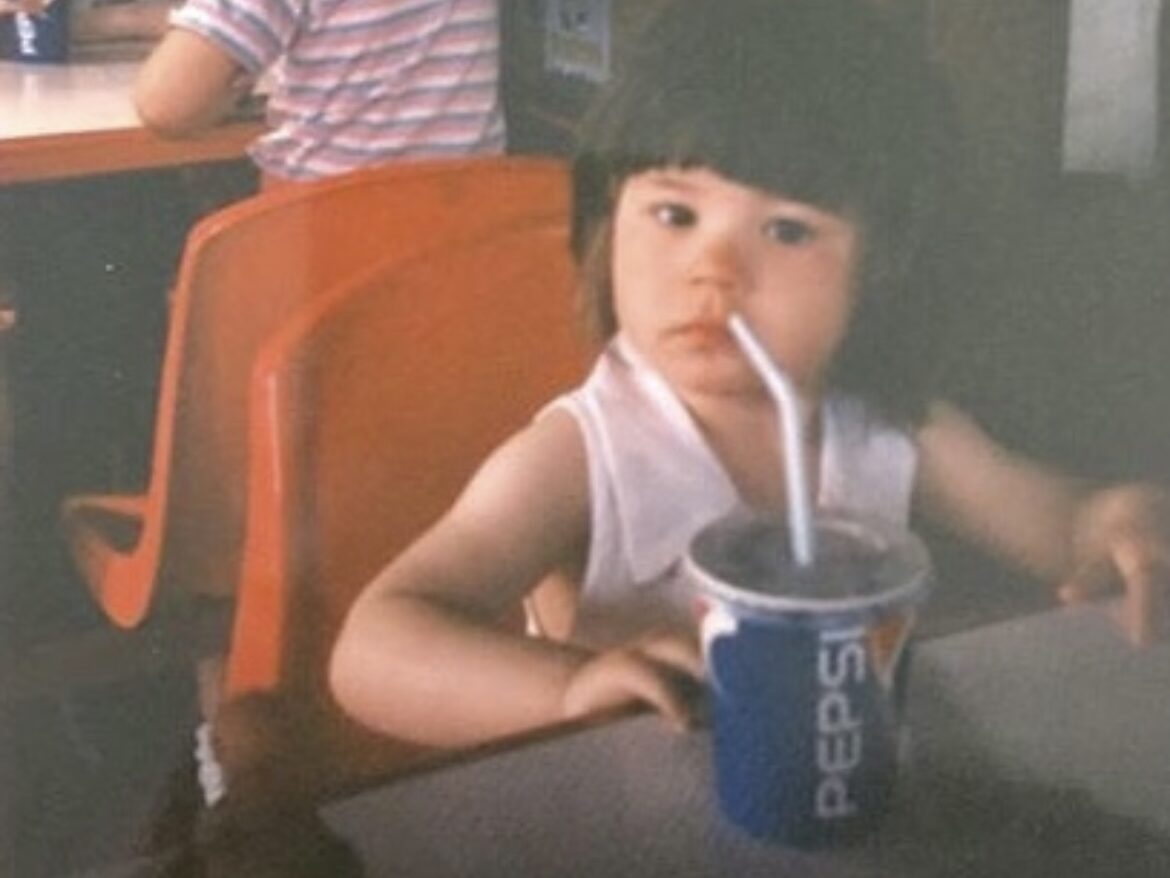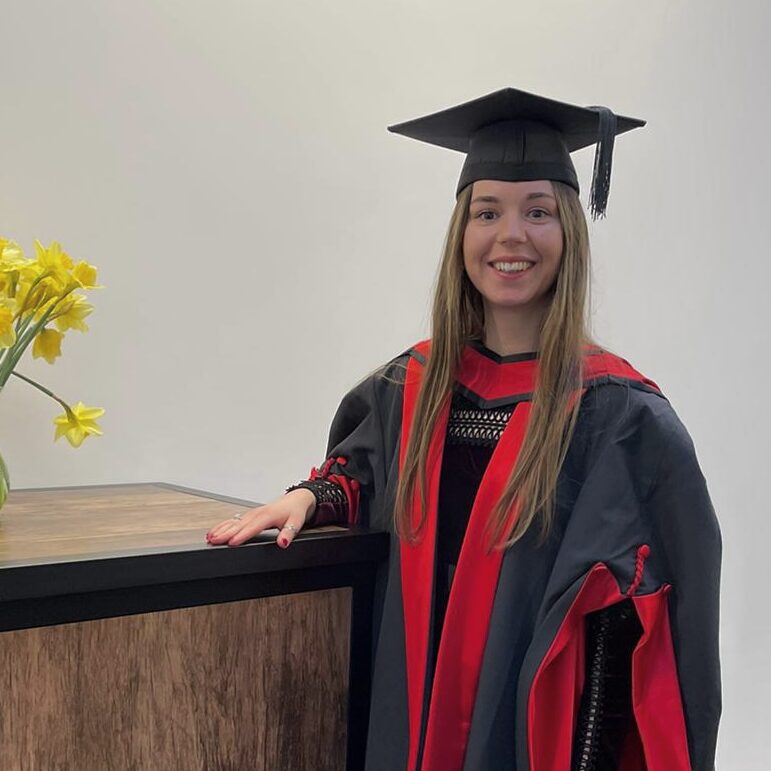Sophia, 28, is a care-experienced young person from Brecon now living in Cardiff. Following her undergraduate and MA in Art, she now works as a children’s residential worker whilst balancing her passion and self-employed career as an illustrator.
Here she shares her fostering journey and how she came to illustrate our Bring Something to the Table cookbook.

you often see that with children in care, they have the same story.
By the time I was eight years old, I had been in around 20 different fostering homes, either in emergency or short break care. I met my forever foster family when I was nine years old after being under a court order for a couple of years.
My birth father died when I was five years old. He wasn’t very active in my life, and I don’t remember him, but I know he was very violent, he was an alcoholic.
Following my birth father’s death, my birth mother looked after us, but she unfortunately suffered badly with her mental health. She couldn’t look after us and growing up, I saw many things that a child should never see.
I am the youngest of four siblings, and when I found out I was going into care, my siblings were sad, but it was a different story for me, I felt happy.
I knew deep down this would save me and change the direction of my life. I felt I just needed to be a child for once and not a carer for my birth mother, I needed normality in my life. I couldn’t take care of my mother, no matter how much I loved her. I needed a good upbringing, warm clothes and a safe home.

all it takes is one person to show you can succeed in anything.
My early experiences of being in foster care were challenging and school was difficult for me as I struggled academically.
There are a lot of stereotypes that go with children or young people in care. It’s presumed that they are badly behaved or don’t enjoy or want to try at school. It was the opposite for me. I was so eager to learn, and I wanted to prove to myself, and others like me, that I could do it. That we – children in care – can thrive in school and succeed.
I knew I wanted to go to university, but I was worried about introducing my background of being in care to the new people I would meet in my student accommodation. I felt ashamed and wasn’t sure how I would bring it up to new friends. When you meet people at university, it’s presumed that everyone grew up with their birth mum and dad, in a nice house but this isn’t the case for everyone.
Every time I met someone new, I had to ‘come out’ as someone who was in foster care as if it was the only identifying thing about me – not the fact that I was a woman, someone passionate about art, or someone who was a great friend.
There’s a statistic that states only 6% of care leavers go to university. This is just people who attend once being accepted and doesn’t account for those who graduate, which is sad.
When you’re growing up in care, university is just not at the forefront of your mind. You have so many other things to worry about. That’s where foster carers can be such a support for young people in care. It just takes one person to push them, show them love, show them that they are intelligent and can succeed in anything.
My foster family encouraged me with my education, they provided a stable upbringing for me as a child and encouraged me in everything I did. I’m so grateful to them for that because it is not the case for every child in care. I’m lucky to have a close relationship with my foster family even now whilst I’m living independently, I still go on holidays with them.

I’ve left care, and look what I’m doing!
There were ups and downs with my fostering journey – it wasn’t easy for me. For children in care, it can go either way. You can learn from the bad experiences, or you recreate them.
People can imagine what you have been through, but they don’t quite understand. I’m a strong person but I struggle every day. Sometimes it can be the simplest thing, a friend says she’s going to see her mum for lunch, and it hurts because I don’t have that.
When I went traveling in my early twenties, I met a group of women and they began talking about foster care, and even then, I didn’t mention it. I guess one of the reasons I was afraid to say I had left care was because of the stereotypes that exist. I once told a colleague of mine I was going to visit my foster parents, and she said, ‘You don’t look like someone who was in care.’ As if we are all supposed to look a certain way?
It has been a journey to get to where I am but now, I wear my story like a medal; ‘I’ve left care and look what I’m doing’.

inspiring people through art
I fell in love with art early on in school. I’m dyslexic (which I only found out in university) so academically, it was more difficult for me in school. I also found it difficult to open up to adults about how I was feeling – that’s where art saved me.
Now as an illustrator, I create pictures about what life is like in the care system and want to inspire other people. Now that I am mentally strong and feel comfortable sharing my stories, I feel like I have a responsibility to help others like me, through my art.
I want to share my story and show children in care that they can do anything because if you’ve been through that, you can do anything because the worst has already happened.

illustrating the foster wales cookbook
My illustrations are in the Foster Wales’ cookbook, Bring something to the table. It was special to be asked to illustrate something that is so close to my heart.
It was a privilege to share my story and recipe. Some of my most important memories are of sitting around the dining table with my foster family and feeling normal, like a family – something every child deserves.
When I first landed in foster care, I vividly recall grilling my foster mum about the origins of the food she presented, insisting it hailed from Brecon, my beloved childhood stomping ground with my birth family. Now, she didn’t exactly embark on a culinary pilgrimage to Brecon for groceries, but she nodded along, claiming it was indeed Brecon-sourced.
Why?
Well, because if it wasn’t from Brecon, it might as well have been served on a spaceship for all I cared! It was a culinary betrayal to my mum and hometown, you see. It took some serious culinary diplomacy to wean me off that Brecon-only diet!
I penned ‘Brecon Bolognese’ for this cookbook, based on my foster mum’s recipe.
My birth mum used to make it and when my foster mum lovingly prepared it on the first night I moved into my foster home, I felt truly welcome.
My foster journey has made me a stronger person. It’s now my superpower. And if I can go through that and come out on the other side, then I can really deal with anything.
Follow Sophia’s illustration account:
https://www.instagram.com/warnerillustrates/Art/

